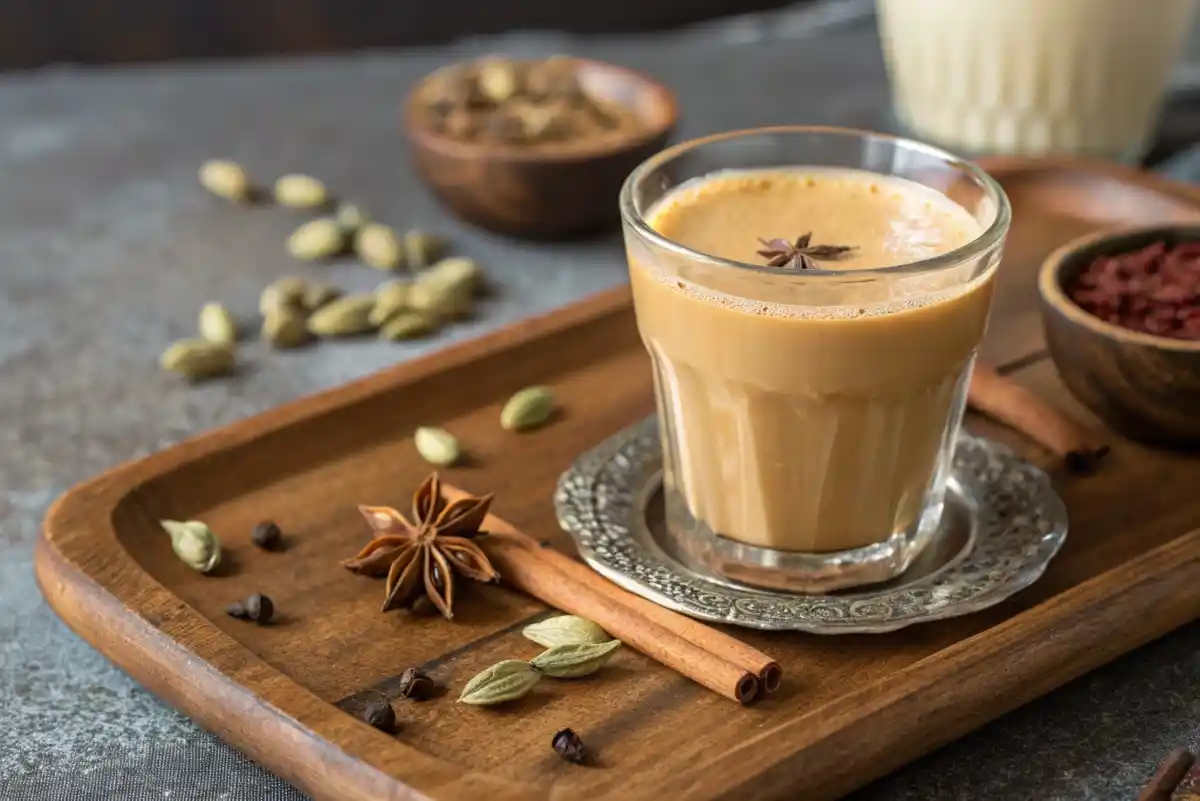Defining Characteristics of Adeni Chai
Tea lovers enjoy Adeni Chai, also called Yemeni tea, for its rich taste and comforting feel. This tasty blend mixes strong black tea, creamy milk, and warm spices like cardamom, cloves, and cinnamon. It comes from the coastal city of Aden, where its special way of preparation gives the tea its unique smell and flavor.
The tea balances sweetness, creaminess, and spice, making it a great choice for anyone looking for a drink that’s both comforting and energizing. Whether you sip it in the lively streets of Yemen or in the comfort of your home, Adeni Chai gives you a soothing and flavorful experience.
How It Differs from Other Teas
Adeni Chai stands out from other teas, like Indian chai or Western milk tea, because it carefully uses spices and follows a unique preparation method. Indian chai usually includes a wider variety of spices, but Adeni Chai focuses on just a few to create a more refined flavor. Cooks prepare Adeni Chai by simmering tea, milk, and spices together for a longer time, which helps the flavors blend and become richer.
Another key difference is its sweetness. People usually add a lot of sugar to Adeni Chai, giving it a dessert-like taste that makes it popular for afternoon tea or after meals.
The Cultural Significance of Adeni Chai
Its Role in Yemeni Traditions and Hospitality
In Yemen, Adeni Chai is more than just a drink; it stands for hospitality and togetherness. Serving Adeni Chai to guests is a common tradition that shows the warmth and kindness at the heart of Yemeni culture. The tea is often shared during gatherings, helping people connect and enjoy time together.
Adeni Chai is also an important part of daily life. Many Yemenis drink it in the morning to start their day with comfort. It’s often enjoyed with traditional Yemeni breakfasts, like mutabbaq (stuffed pancakes) or sabaayad (flatbread).
A Popular Beverage Across the Arabian Peninsula
Although Adeni Chai started in Yemen, tea lovers have made it popular across the Arabian Peninsula and beyond. Its rich and flavorful taste is a favorite in countries like Saudi Arabia, the UAE, and Oman, where cafes often serve it with local sweets.
In recent years, the global love for Adeni Chai has grown. Its unique flavor has introduced people around the world to the rich food traditions of Yemen, making it a cultural connection between regions.
Ingredients and Tools for Making Adeni Chai
Core Ingredients That Define Its Flavor
To create an authentic cup of Adeni Chai, a few key ingredients are essential:
- Black Tea Leaves: The robust base of the tea. Popular varieties include Assam or locally sourced Yemeni tea leaves.
- Milk: Whole milk is traditionally used for its richness, but alternatives like evaporated milk or plant-based options can work too.
- Spices: Cardamom, cloves, and cinnamon are the most common spices, each contributing depth and warmth to the tea.
- Sugar: Adeni Chai is typically sweetened generously, though the amount can be adjusted to taste.
These ingredients come together to form a harmonious blend that’s both comforting and energizing.
Kitchen Essentials for Preparing the Tea
Making Adeni Chai at home requires a few basic tools:
- Saucepan or Tea Pot: For simmering the tea, milk, and spices. A heavy-bottomed pan works best to prevent scorching.
- Strainer: To remove the tea leaves and spices after brewing.
- Measuring Spoons: For precise quantities of tea and spices.
With these tools and ingredients, anyone can recreate the authentic flavors of Adeni Chai in their own kitchen.
For more sweet and flavorful ideas, check out this easy and moist banana bread recipe without butter.
What is Adeni Chai Made Of?

Core Ingredients in Adeni Chai
Black Tea Leaves and Milk
At the core of this tea are two main ingredients: black tea leaves and milk. The tea leaves create a strong and slightly tangy base that goes perfectly with the creaminess of milk. Common types of tea used include Assam, Ceylon, or Yemeni varieties known for their rich taste.
Milk gives this tea its smooth texture and creamy feel. People often use whole milk, but evaporated milk is another option for a richer flavor. For those who prefer plant-based choices, almond or oat milk can work well while keeping the tea’s creamy texture.
Unique Spices Like Cardamom and Cloves
What truly sets this tea apart is its distinctive spice blend. Cardamom and cloves are the stars of the show, adding layers of warmth and aromatic depth. Cardamom lends a slightly sweet and citrusy note, while cloves contribute a bold, earthy undertone.
Cooks sometimes include additional spices like cinnamon or nutmeg to create a more complex flavor profile. They simmer these spices with the tea and milk, allowing the flavors to blend fully into the beverage, which makes the drink both fragrant and flavorful.
Variations of Adeni Chai Across Regions
Adjusting Sweetness and Spices to Taste
this tea is as versatile as it is delicious, with regional and personal variations that cater to different palates. In Yemen, the tea is traditionally sweetened generously, giving it a dessert-like quality. However, in neighboring countries, it may be less sweet to let the spices shine.
The level of spice is another area of variation. Some prefer a strong, spicy kick, while others opt for a subtler blend. Adding or omitting spices like cinnamon or ginger allows for customization, making this tea a drink that can be tailored to individual tastes.
Does Adeni Chai Have Caffeine?
The Role of Black Tea in Caffeine Content
Comparing Adeni Chai to Other Caffeinated Beverages
Yes, this tea contains caffeine, as black tea is one of its main ingredients. On average, a cup of this tea has about 30–60 mg of caffeine, depending on the strength of the tea leaves used. This places it somewhere between a standard cup of tea and a mild coffee in terms of caffeine content.
Compared to coffee, which often has over 90 mg of caffeine per cup, Adeni Chai offers a gentler energy boost without the jittery side effects. It’s an ideal choice for those who want a flavorful and energizing beverage that’s less intense than coffee.
Decaffeinated Options for Adeni Chai
For those who prefer to avoid caffeine, decaffeinated black tea leaves can be used as a substitute. This allows you to enjoy the rich, spiced flavors of Adeni Chai without the stimulating effects of caffeine. Herbal tea bases, like rooibos, are another option for creating a caffeine-free version of this beloved drink.
Benefits and Considerations of Caffeine in Adeni Chai
Impact on Energy and Alertness
The moderate amount of caffeine in this tea provides a gentle energy boost, making it a popular choice for mornings. The combination of caffeine and warm spices can enhance focus and alertness, helping you start your day right.
That said, the milk and sugar in the tea can soften the effects of the caffeine, leading to steady energy instead of a quick surge.
Is Yemeni Tea Healthy?
Health Benefits of Adeni Chai’s Ingredients
Antioxidants in Black Tea and Spices
This spiced tea is not only delicious but also packed with health benefits. Black tea is rich in antioxidants, like polyphenols, which help reduce oxidative stress and support overall health. The spices, such as cardamom and cloves, also offer their own wellness perks.
Cardamom aids digestion and provides anti-inflammatory benefits, while cloves contain vitamins and minerals, including vitamin C and manganese. Together, these ingredients make this tea as nourishing as it is comforting.
Digestive Benefits of Cardamom and Cloves
In traditional Yemeni culture, people often enjoy this tea after meals because of its digestive benefits. For example, cardamom helps reduce bloating and indigestion, while cloves support digestion and ease inflammation. Furthermore, these spices not only improve the tea’s flavor but also make it a helpful drink for overall wellness.
Balancing Sugar and Milk for a Healthier Version
Tips for Reducing Calories Without Losing Flavor
While Adeni Chai is traditionally sweetened generously, it’s possible to create a healthier version without compromising its flavor. Here are some tips:
- Use Less Sugar: Start with a smaller amount and adjust to taste. Natural sweeteners like honey or stevia can also be used.
- Choose Low-Fat Milk: Opt for low-fat or skim milk instead of whole milk for a lighter option. Plant-based milks like almond or oat can further reduce calorie content.
- Add More Spices: Enhancing the spice blend can help compensate for reduced sweetness, ensuring the tea remains flavorful and aromatic.
These adjustments allow you to enjoy the comforting qualities of Adeni Chai while aligning with personal dietary goals.
Making Adeni Chai at Home
Step-by-Step Recipe for Traditional Adeni Chai

Preparing the Base with Tea and Milk
Creating a perfect cup of Adeni Chai at home is simple and rewarding. Here’s how to make it:
Ingredients:
- 2 cups water
- 2 tbsp black tea leaves (Assam or Ceylon recommended)
- 1 cup whole milk (or your preferred alternative)
- 3–4 cardamom pods, lightly crushed
- 2 cloves
- 1 small cinnamon stick
- 3 tbsp sugar (adjust to taste)
Instructions:
- Boil the Tea: In a saucepan, bring water to a boil and add the tea leaves. Let it simmer for 3–4 minutes to release the tea’s full flavor.
- Add Spices: Add the cardamom, cloves, and cinnamon stick. Simmer for an additional 2–3 minutes, allowing the spices to infuse into the tea.
- Incorporate Milk: Pour in the milk and stir well. Simmer gently for another 5 minutes, ensuring the flavors meld together.
- Sweeten: Add sugar and stir until dissolved. Adjust sweetness to your preference.
- Strain and Serve: Strain the tea into cups, discarding the tea leaves and spices. Serve hot and enjoy!
Infusing the Spices for Authentic Flavor
The secret to Adeni Chai’s rich flavor lies in the spices. Crushing cardamom pods and using whole cloves ensures maximum aromatic release. Simmering the spices with the tea and milk enhances the infusion process, creating a beverage that’s deeply flavorful and authentically Yemeni.
For an added touch, experiment with other spices like ginger or nutmeg to create your own signature version of Adeni Chai.
Creative Variations of Adeni Chai

Adjusting Ingredients for Dietary Preferences
Adeni Chai can be customized to suit various dietary needs without compromising its essence. Here are some popular modifications:
- Lactose-Free: Replace whole milk with almond, oat, or coconut milk for a plant-based option.
- Low-Calorie: Use low-fat milk and natural sweeteners like stevia or honey instead of sugar.
- Caffeine-Free: Substitute black tea leaves with rooibos for a similar rich flavor minus the caffeine.
These adjustments make Adeni Chai accessible to a wider range of tea lovers.
Adding Unique Spices for Personal Flair
While the traditional recipe calls for cardamom, cloves, and cinnamon, you can experiment with additional spices to put your own twist on this tea . Consider these options:
- Saffron: Add a few strands for a luxurious touch and golden hue.
- Vanilla: Stir in a splash of vanilla extract for a mellow, creamy flavor.
- Ginger: Grate fresh ginger into the tea for a zesty kick.
These creative variations allow you to enjoy Adeni Chai in exciting new ways while honoring its traditional roots.
You can try using spices like nutmeg or ginger, as seen in these irresistible dessert ideas with a Ninja Creami.
Serving Adeni Chai for Special Occasions

Pairing This Tea with Yemeni Desserts
This spiced tea pairs beautifully with traditional Yemeni sweets, enhancing the overall experience. Some popular pairings include:
- Bint Al-Sahn: A honey-glazed Yemeni bread that complements the tea’s creamy texture.
- Luqaimat: Fried dough balls with a sticky sweet glaze, perfect for festive occasions.
- Basbousa: A semolina cake with a hint of rosewater, balancing the tea’s spices.
These desserts make it an excellent choice for hosting guests or celebrating special moments.
Pair Adeni Chai with delightful treats like these tates chocolate chip cookies for an irresistible combo.
Presentation Tips for a Warm and Inviting Experience
When serving this tea , presentation plays an important role in creating a welcoming atmosphere. Here are a few tips:
- Use Traditional Cups: Small glass cups or porcelain teacups add an authentic touch.
- Serve with Snacks: Arrange a platter of Yemeni desserts or light snacks alongside the tea.
- Garnish Thoughtfully: Add a cinnamon stick or a sprinkle of crushed cardamom on top for an elegant finish.
These details elevate the experience, making this tea more than just a beverage—it becomes a centerpiece of hospitality.
Final Thoughts on Adeni Chai
Why This Tea is Beloved Worldwide
Adeni Chai’s global appeal lies in its rich, aromatic flavor and cultural significance. This tea brings people together, fostering warmth and connection through its comforting qualities. Its versatility, from traditional recipes to creative adaptations, ensures it remains a favorite across generations and borders.
Encouraging Exploration of Yemeni Culinary Traditions
This tea is more than a drink; it’s an invitation to explore Yemeni culture and traditions. By preparing and enjoying it, you’re embracing a piece of Yemen’s rich heritage. Whether you follow the classic recipe or add your own twist, this flavorful beverage offers a warm and delightful taste of Yemeni hospitality.
For another comforting recipe, try this mastering Japanese beef stew with roux for dinner.
FAQs
What is Adeni Chai Made Of?
Key Ingredients and Their Roles
Adeni Chai is made with a blend of bold black tea, creamy milk, and aromatic spices such as cardamom, cloves, and cinnamon. The black tea provides a robust base, milk adds richness, and the spices create a warm, fragrant flavor profile. Sugar is typically added to sweeten the tea, but the level of sweetness can be adjusted to taste.
Variations in Recipes Across Families and Regions
Each family or region may have its own variation of Adeni Chai. Some recipes include additional spices like ginger or nutmeg, while others may adjust the milk-to-tea ratio for a creamier or lighter texture. These variations make this tea a versatile beverage that reflects personal and regional tastes.
Does Adeni Chai Have Caffeine?
Amount of Caffeine Compared to Other Teas
Yes, Adeni Chai contains caffeine due to its black tea base. On average, a cup of Adeni Chai has 30–60 mg of caffeine, which is less than a cup of coffee but more than some herbal teas.
Decaffeinated Alternatives for Adeni Chai
For a caffeine-free option, you can either use decaffeinated black tea leaves or substitute the tea base with rooibos. This way, you can still enjoy the rich flavors of Adeni Chai while avoiding the stimulating effects of caffeine.
If you want a delicious alternative, check out this green shakshuka recipe for a healthy breakfast option.
Is Yemeni Tea Healthy?
Nutritional Benefits of Black Tea and Spices
Adeni Chai offers several health benefits thanks to its ingredients. Black tea is rich in antioxidants that support heart health and reduce oxidative stress. The spices, such as cardamom and cloves, provide anti-inflammatory and digestive benefits, making this tea a comforting and functional beverage.
How to Make a Healthier Version of Adeni Chai
To create a healthier version of Adeni Chai, consider reducing the sugar or using natural sweeteners like honey. Low-fat or plant-based milk options can also help lower calorie content without compromising the tea’s creamy texture.
What is the History of Adeni Tea?
Its Origins and Role in Yemeni Culture
Adeni Chai originates from the coastal city of Aden in Yemen, where it has long been a symbol of warmth and hospitality. Moreover, it is traditionally served to guests, reflecting the generosity and rich cultural heritage that are central to Yemeni traditions.
Influence of Adeni Chai on Regional Tea Traditions
Over the years, Adeni Chai has significantly influenced tea culture across the Arabian Peninsula and beyond. For example, its unique blend of tea, milk, and spices has inspired similar beverages in neighboring countries. As a result, Adeni Chai continues to leave a lasting impact on both regional and global tea traditions.

